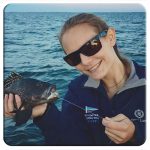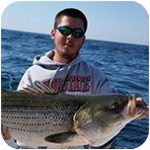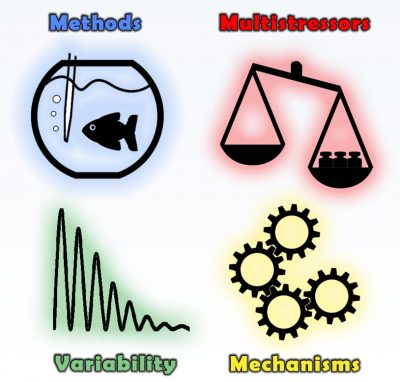






At the OA PI meeting, Hannes gave an summary talk of key advances in the field of experimental OA approaches, while all of us worked in small synthesis groups on synthesizing products and projects.
Portland, albeit rainy, was as usual a great city to come to.
OSM2018 sessions OC51, OC52 (Baumann, Maas, Rivest, Davis)
Multiple Stressors and Multiple Disciplines: Understanding the Consequences of Global Ocean Change for Marine Species
-
Session 1
- Zimmerman et al. Modeling the Impacts of Water Quality and Climate Change on Submerged Aquatic Vegetation in the Chesapeake Bay
- Frieder et al. Advancements in Quantifying Energy Costs for Organisms to Respond to Ocean Change
- Hofmann et al. Who’s Your Mommy? Transgenerational Effects in Purple Sea Urchins from Nearshore Kelp Forests in California
- Waldbusser et al. Understanding the multi-stressor impacts of ocean acidification on marine calcifiers: What controls biocalcification? Saturation state or substrate inhibitor ratio
- Silbiger et al. Nutrient addition disrupts dependence of calcification on aragonite saturation state
- Cross et al. A 120-year record of resilience to environmental change in brachiopods
- Dam et al. The copepod Acartia tonsa in a greenhouse world: Transgenerational plasticity of life history traits
- McLaskey et al. Ocean Acidification Driven Changes to Food Quality are Transferred Unpredictably Across Trophic Levels
-
Session 2
- Palmer et al. Recent Fossil Record Provides Unique Insight into Impacts of Multiple Stressors on Community Ecology
- Krumhardt et al. Coccolithophore growth and calcification under future oceanic conditions
- Rivest et al. Multiple stressors elicit unique responses in animal and algal partners: the potential for physiological plasticity in symbiotic coral larvae under global ocean change
- Cornwall et al. Impacts of pH Variability and Past pH History on Coral and Coralline Algal Calcification: a Mechanistic and Multi-generational Approach
- Eagle et al. Combining microelectrode and geochemical approaches to study the impact of pCO2 and temperature changes on the internal pH and carbonate chemistry of corals and their relation to growth responses
- Weinnig et al. Physiological Response of a Cold-Water Coral (Lophelia pertusa) to the Combined Stressors of Climate Change and Hydrocarbon Influence
- Bednarsek et al. Interactive effects of temperature and acidification on pteropod distributions in the California Current Large Marine Ecosystem
- Davis et al. Juvenile Rockfish Recruits Show Resilience to CO2-Acidification and Hypoxia across Biological Scales
